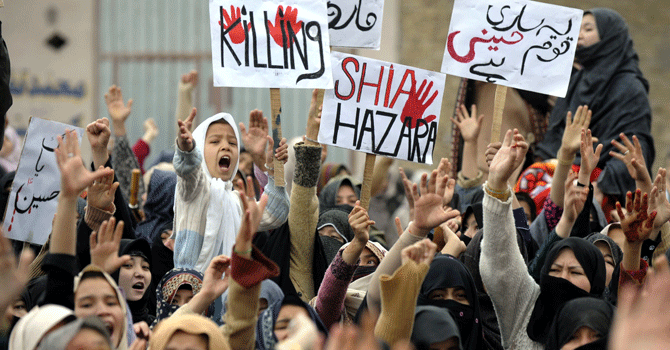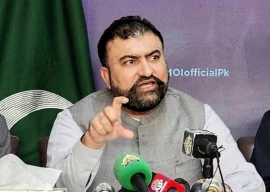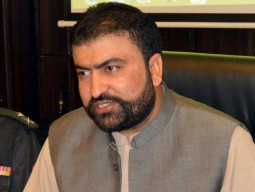
There are some days when Jawad Hazara follows his son Ibtihaj’s school van as it ferries the 12-year-old boy from his home in Quetta’s Gulistan Town till the entrance to the cantonment area where Army Public School and College Seven Streams is located.
“Sometimes my heart will not rest until I see that van enter the cantonment,” Jawad says. After the attack last month on the Army Public School in Peshawar, Jawad feels his son is in greater danger, particularly in a city where his distinct features mark him out as an easy target. “If they can do that to army children, just imagine what would happen if someone entered Ibtihaj’s school. He is a Hazara boy. If anyone came to attack the students, the Hazaras would be killed first,” Jawad says.
On Wednesday, Jawad and his family observed the death anniversary of 19-year old Farwa, and 10-year old Ridha, as well as their mother and grandmother. It has been one year since they were killed in a bomb attack on two buses carrying Shia pilgrims from Quetta to Taftan. Twenty two people were killed when an explosion ripped through the bus in Dringhar area, on the main Quetta-Taftan highway in Mastung district, some 50 kilometres southwest of Quetta. The banned sectarian militant group Lashkar-e-Jhangvi claimed responsibility for the attack, which left 32 people, including Ibtihaj and his then 18-year-old brother Meraj injured.

At 3pm, Ibtihaj has just returned from the graveyard, where family members distributed Niyaaz and prayed for the deceased. In the moment, you might expect Ibtihaj’s spirits to be dampened. However, he chatters about the last good comedy he watched (‘Johnny English’), learning to fly a kite in anticipation of Basant and how he had to hurriedly change his clothes to visit the graveyard as a Playstation game with his cousin ran overtime.
“Over this year, he has come to terms with what happened,” his father explains. “We both try not to remember too much of the attack, as it will only negatively affect us.”
While Ibtihaj was undergoing treatment for injuries after the attack, Jawad says he tried to surround the little boy with as many friends and family members as possible.
“I didn’t want him to feel the absence of his mother or sister,” he says. “When he would ask me where they were, I would say, ‘Don’t worry and just focus on yourself or I’ll get angry.’” He adds, “When I get angry, he feels quite bad. We’re not just father and son, you see, we’re friends.”
“I keep getting sick these days,” Ibtihaj complains. “It is very cold in Quetta and my throat keeps getting bad.” Other than that, however, he says he is in good health. “He sometimes remembers the attack, especially on his sister or mother’s birthdays. But please do not ask him any more questions, we want things to be as normal for him as possible now,” Jawad says.
The family is slowly knitting itself back together. Jawad remarried a few months ago and Ibtihaj is close to his new mother, a former schoolteacher.
“It might have been right or wrong, but after the attack, I did not even think of taking Ibtihaj or Meraj for counselling, nor were we offered any trauma counselling,” Jawad says. “I work from morning until night and I need to support my family, make sure they’re safe and happy, make sure they never know that I am sad or scared. Even if a man is a magician, he cannot do all of that.”
While Ibtihaj navigates his way deftly on social media, Jawad says he had no clue that a photograph of Ibtihaj and his sister Ridha was shared by PPP Chairman Bilawal Bhutto Zardari soon after the attack. “My friends told me that within 24 hours, that picture was liked by thousands online,” he recalls.
However, he is wary of such attention, saying politicians often meet survivors just to ‘cry crocodiles’ tears”. “It did not matter to them that even when I was invited to the Bilawal House in Karachi, I was too scared to take my son there because of who might see us and try to kill us just for being Hazara,” he says. “Even if the government gave Ibtihaj a scholarship to study at a university here in Quetta, the institution is located in a no-go area for Hazaras, an area where they will be spotted from miles away and shot. We live in fear 24 hours a day.”
Any media attention has not translated into improvements in the welfare of the attack’s survivors either, he argues. “Do these politicians know that some of the survivors have to pay up to Rs1,000 per day on medicines?”
Jawad has formed a trust to help these survivors, the Al Qaim Welfare Trust, and he says ordinary citizens help whenever they can. On Sunday night, for instance, Jawad was approached by a man at a local restaurant, and given a heavy packet.
At first, he thought the man was giving him food. The packet was filled to the brim instead with coins – small change gathered over a month for the survivors of the Mastung attack.
Published in The Express Tribune, January 22nd, 2015.
COMMENTS (3)
Comments are moderated and generally will be posted if they are on-topic and not abusive.
For more information, please see our Comments FAQ

















Hazara killing is the result of concession given to the killers by last regime. Lets hope the new security setup will change its mind.
That which does not kill us makes us stronger.
Friedrich Nietzsche I think this incident in the early age of the guy might define the character of this guy for the rest of his life.
Shame to Pakistan army that can't protect Hazaras, who is part of Pakistan nation, and has given a lot of sacrifices for Pakistan, since its creation.